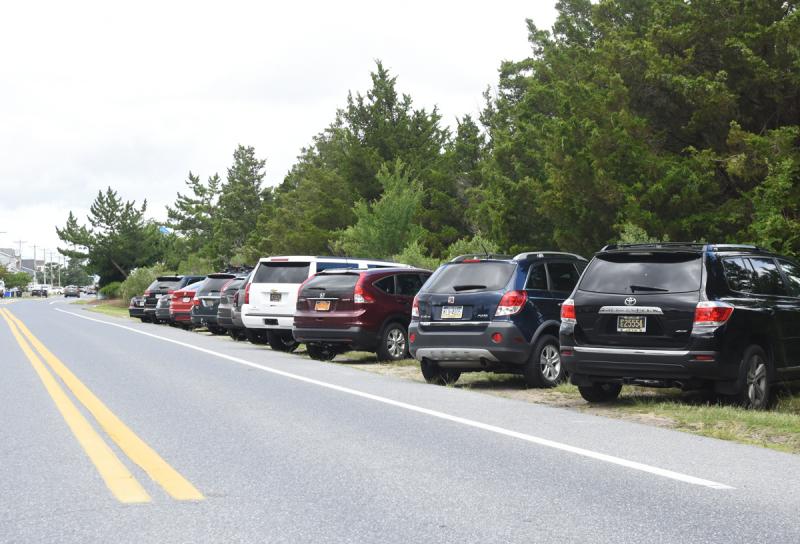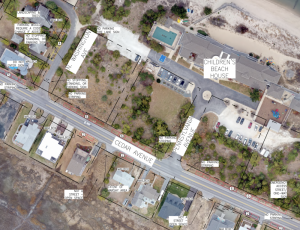Lewes seeks input on beach parking permits
City staff are working to finalize a parking permit proposal for Lewes Beach.
But before they make a pitch to mayor and city council, they are seeking the public’s input on key aspects of the plan.
“The goal is really to manage the parking in a way that’s predictable and is respectful to the fact that it’s a residential neighborhood,” said City Manager Ann Marie Townshend.
The city has created a page on its website for the public to select preferred options on a number of the plan’s elements, including whether to use zone parking, the type of parking permit, the cost of a permit and how to delineate parking spaces. The city also asks if the permits should be available exclusively to Lewes residents or if the general public should be included. Each section has a short video explaining options. The public may participate through Friday, Jan. 28.
There are an estimated 573 potential parking spaces on Lewes Beach between Savannah Road and Roosevelt Inlet. The city’s engineer George, Miles & Buhr identified 176 spaces where parking is obstructed due to landscaping, trees, shrubs, walkways or fence posts.
Permits would be only for on-street parking. Homeowners would not need a pass to park in their driveways.
The plan does not include parking spaces on Bay Avenue because the city’s right of way is too narrow, Townshend said. The Roosevelt Inlet parking lot also is not included, as it is state owned.
In order to have an effective parking permit system, Townshend says the city needs to bring order to Lewes Beach parking areas. To do that, she said, the city needs to clearly identify and delineate parking spaces.
GMB has presented four options to delineate spaces: Railroad ties with striping, signage at each end of the street, recycled rubber parking bumpers, or flexible rubber bollards at the end of each space.
Also under consideration is whether the city should set up parking zones where a permit holder would be issued a permit for a specific zone. If the city goes with a no-zone approach, permit holders would be allowed to park anywhere in the entire residential beach area.
Permits would be required from May 1 through Sept. 30, but the types of permits to be offered are still undecided – the city is considering daily, weekly, seasonal or some combination of all three.
The cost for each type of permit is also up for debate. City staff is considering either $20 or $30 for daily permits, $50 or $75 for weekly permits and $100, $150 or $200 for seasonal permits.
“I would suspect that we would look at a tiered system,” Townshend said. “I would not expect to charge the same for Lewes residents as we would charge to nonresidents.”
The city is considering clustering mailboxes for Lewes Beach homes. Residents are asked to provide feedback on whether they’d prefer clustering to traditional mailboxes.
After the Jan. 28 deadline, city staff will review all the selections and comments to develop a parking permit plan to present to mayor and city council at its Monday, Feb. 14 regular meeting.
Public reacts
City staff held a pair of virtual workshops about the parking permit system Jan. 18, drawing more than 115 people. Staff, primarily Townshend, answered questions from residents for more than three hours.
Many residents asked if parking could be reserved in front of their homes.
“The reality is with on-street parking, you’re never assured you’re going to be able to park in front of your house,” she said.
City code requires two off-street parking spaces, Townshend said. The city has received comments from homeowners on the beach who do not have any off-street parking because it was not required when their homes were built. In those specific cases, she said, the city may consider taking some action. However, Townshend noted there are very few homes without driveways.
She said the city’s goal is not to add to the parking inventory, but to better organize and manage what exists. Since the pandemic, she said Lewes Beach’s residential streets have been discovered. Prior to enforcement in 2021, she said, parking was so bad in some areas that it likely would have prevented emergency vehicles from being able to pass through a street.
“There is no part of this process that is looking to jam in as many spaces as we can,” she said. “We certainly understand that’s a balancing act. At the same time, it is a public beach.”
Another observation, she said, is many people are parking on the residential streets to avoid having to pay to park at Savannah Beach (Beach 1) and Johnnie Walker Beach (Beach 2).
Some residents were concerned homeowners would expand their driveways to prevent parking in front of their home, but Townshend noted in 2018, mayor and city council amended the code to make it clear driveways cannot exceed 20 feet in width. The city cannot retroactively enforce the regulation where wider driveways already exist.
A few in attendance questioned why the city’s residents would be forced to buy a parking permit.
“Mayor and city council have to figure out if that cost [to administer the program] will be borne by the existing tax base or through fees,” Townshend said. “That’s a policy decision that ultimately city council needs to make. From my perspective as the manager, if we’re adding a permit system, we’re adding a cost, and that cost needs to be paid for somewhere, whether it’s through fees or through taxes.”
Parking Enforcement Supervisor Dennis Crawford said the cost to implement and run the plan remains unknown because the city needs feedback from residents on preferences before moving ahead with estimates.
Townshend said there were some residents who have said they do not want a parking permit system. Those people are encouraged to submit comments saying just that at the bottom of the parking permit website where it says “submit additional comments here.”
Both residents and nonresidents are permitted to participate in the survey. An address is required when making selections, so staff will be able to parse through preferences of different groups.
Nick Roth is the news editor. He has been with the Cape Gazette since 2012, previously covering town beats in Milton and Lewes. In addition to serving on the editorial board and handling page layout, Nick is responsible for the weekly Delaware History in Photographs feature and enjoys writing stories about the Cape Region’s history. Prior to the Cape Gazette, Nick worked for the Delmarva Media Group, including the Delaware Wave, Delaware Coast Press and Salisbury Daily Times. He also contributed to The News Journal. Originally from Boyertown, Pa., Nick attended Shippensburg University in central Pennsylvania, graduating in 2007 with a bachelor’s degree in journalism. He’s won several MDDC awards during his career for both writing and photography. In his free time, he enjoys golfing, going to the beach with his family and cheering for Philadelphia sports teams.





















































